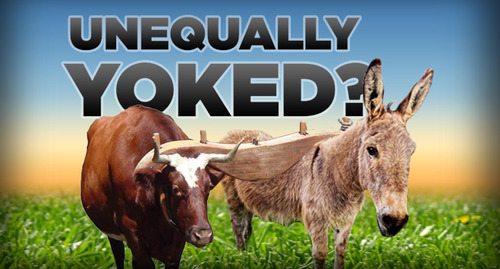 This cogent question found in Amos 3:3 cuts to the core. “Can two walk together, unless they are agreed?” Any relationship that straddles two divergent views is doomed from the start. Even pacific relationships encounter threats, challenges and obstacles if they are to make it. Throw in a fundamental disagreement and you have a recipe for war. While “politics make strange bedfellows,” the thin broth lacks enduring substance. Once the issue that forged the compromise fades, it’s over.
This cogent question found in Amos 3:3 cuts to the core. “Can two walk together, unless they are agreed?” Any relationship that straddles two divergent views is doomed from the start. Even pacific relationships encounter threats, challenges and obstacles if they are to make it. Throw in a fundamental disagreement and you have a recipe for war. While “politics make strange bedfellows,” the thin broth lacks enduring substance. Once the issue that forged the compromise fades, it’s over.
Sometimes, partnerships, coalitions and marriages seem so desirable, so pressing, so vital that people sacrifice deeply held convictions to make them work. Members of political parties are often asked to overlook immoral platforms and planks or unethical practices to maintain their membership. Employees often put up with offensive corporate objectives, obnoxious bosses or nearly intolerable conditions in order to keep their jobs. The spate of sexual abuse allegations in recent times involved victims who kept quiet either through bribery or threats. The number of high profile individuals whose careers came crashing down underscored the disastrous consequences of toxic relationships.
But, the more intimate the arrangement, the more critical is the need for oneness. Marriages can only survive when both husband and wife share the same views about life in general. The Apostle Paul warned, “Do not be unequally yoked together with unbelievers. For what fellowship has righteousness with lawlessness? And what communion has light with darkness?” 2 Corinthians 6:14. “Unequally yoked” goes back to Old Testament times when animals were used to plow fields. “You shall not plow with an ox and a donkey together.” Deuteronomy 22:10. The two animals have different instincts and demeanors. They will not work in tandem with each other.
In humans, the same principle applies. Love-struck romantics, however, often cast all care to the wind when they profess their love and commitment to each other. Unfortunately, their naiveté tanks all too quickly when they really learn what each other is made of. Pre-marital counseling questions should probe the relationship. “Are you in debt? Are you in trouble with the law? Are you on parole? Have you been convicted of a felony or misdemeanor? Have you ever been committed to a psychiatric facility? Do you have serious health issues? Has your prospective spouse seen your health records? Have you been honest in talking about previous relationships? Have you used illegal drugs? Do you have any dependents that you have not mentioned? How secure is your job?” Questions like these are difficult to ask. People who want a relationship desperately enough will avoid asking them for fear that they will get the wrong answer.
Even more importantly, questions about spiritual beliefs, child-rearing and basic life goals need to be asked and answered before marriage is even considered. Certainly, there are instances where these differences have been brooked, but, in almost every case, it has meant that feelings have been suppressed for the sake of the relationship. This situation amounts to a fundamental change in each person‘s character and worldview. They may forever rue the day that they put their heads in the proverbial sand and chose to be willfully ignorant. Pay now or pay later.
Saying no to a prospective relationship may sting now, but saying yes may be catastrophic. Do what’s right. There are things worse than loneliness.